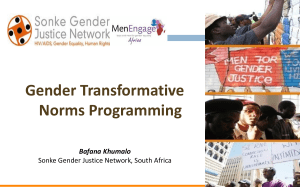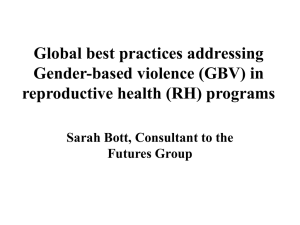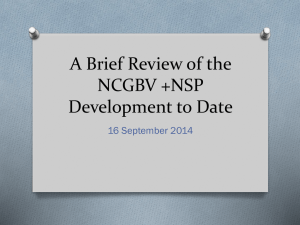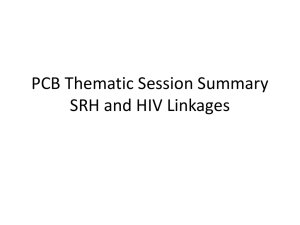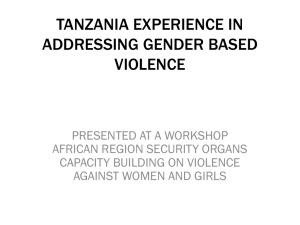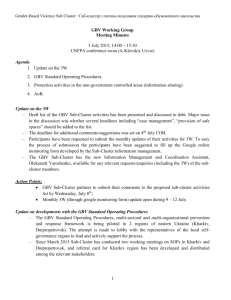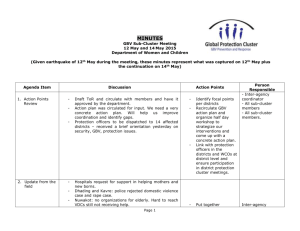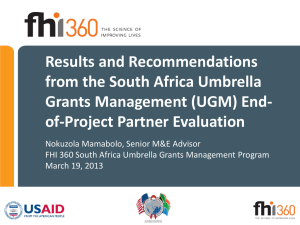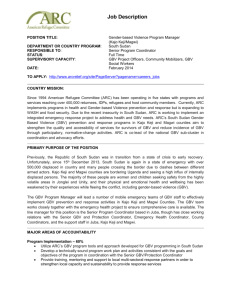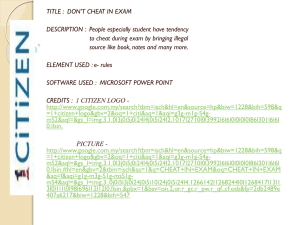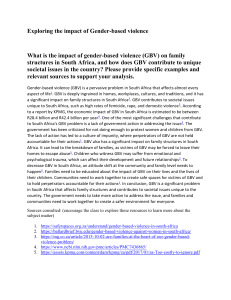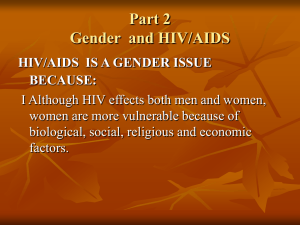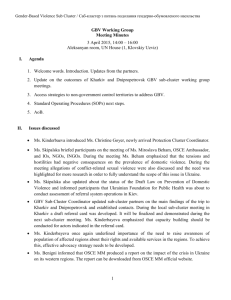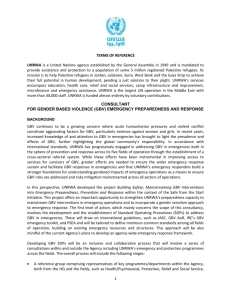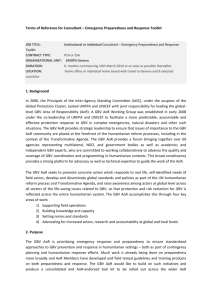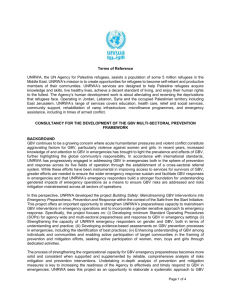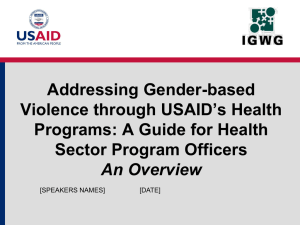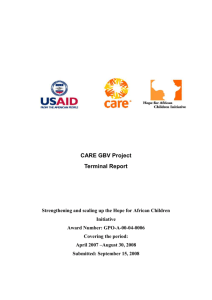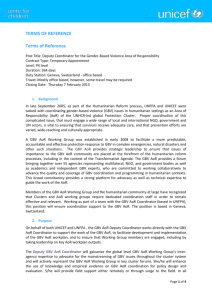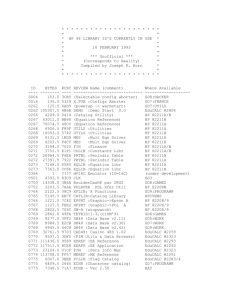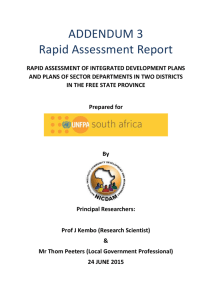11NkonzoKhanyileDaka..
advertisement
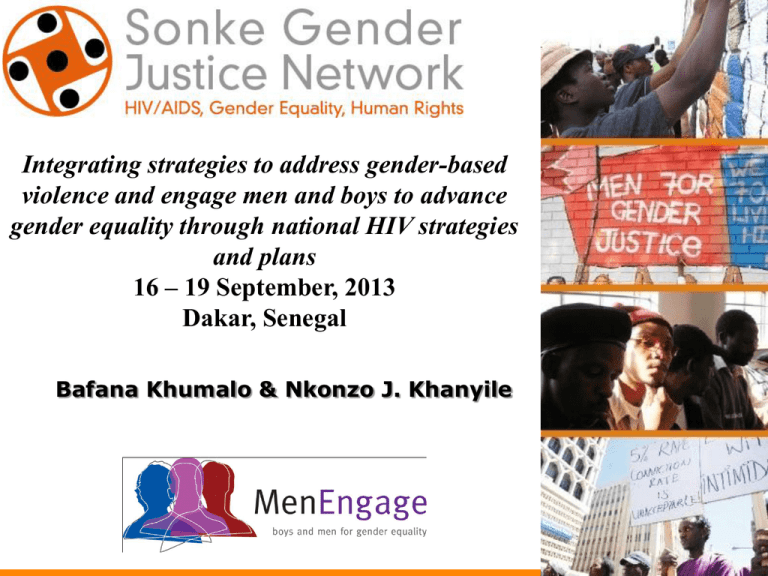
Integrating strategies to address gender-based violence and engage men and boys to advance gender equality through national HIV strategies and plans 16 – 19 September, 2013 Dakar, Senegal Bafana Khumalo & Nkonzo J. Khanyile Introduction & Background • The reports/score cards were developed by Sonke Gender Justice Network, on behalf of the MenEngage Africa Network, with the support of the (UNDP), (UNFPA) and the Swedish International Development Cooperation Agency (SIDA) • It was developed to be used as an advocacy and programming tool, to strengthen a focus on engaging men for gender equality within national laws and policies • Provides an analysis of whether selected policies, laws and plans in the in the selected countries contain language relating to the proactive and progressive engagement of men and boys. Introduction & Background Cont. • It examines five key areas that are critical for gender equality, namely: – – – – – HIV and AIDS; Gender-Based Violence (GBV); Sexual and Reproductive Health and Rights (SRHR); Parenting; and LGBTI. Aims to provide the following: • Importance of engaging men and boys in the elimination of GBV and • Offers an opportunity to address the gaps and priorities identified in existing laws and policies. • It can also be used to identify key areas and priorities for policy advocacy Who should use this report • • • • Civil society, Governments, Law and policy-makers as well as Decision makers working in the development of legislation GBV In spite of 5-10 years of laws against GBV and prevention activities, rates still alarmingly high Results from the International Men and Gender Equality Survey – ICRW and Promundo HIV Benefit of Plans made Plans made engaging Links to challenge to engage with men to between HIV or transform with men for support and Gender Gender prevention of PMTCT addressed Norms GBV processes recognised Marginalize Male Plans made Plans made d men’s Plans made circumcision Plans made to to target to target men needs to encourage roll-out address men for for accounted for and enable prioritised, men’s VCT and Treatment (e.g. men to including attitudes address and address Prisoners, become gender towards health health MSM, involved in equality Condoms seeking seeking refugees and Carework education behaviour behaviour IDUs) Cote D’Ivoire 2006-2010 Ethiopia 2009 – 2011 Kenya 2010 – 2013 Namibia 2011 – 2016 Rwanda 2009 - 2012 Sierra Leone 2011-2015 South Africa 2012-2016 Tanzania 2008 – 2012 Uganda 2008 – 2012 Zambia 2011 – 2015 Zimbabwe 2011 - 2014 Key Room for improveme Adequate Inadequate nt /Mixed policies GBV Commitment to Sufficient Efforts made Gender-based Level of Men engaged Provision of the Acknowledgement focus on to protect violence clearly engagement as advocates rehabilitation transformation of the violence preventative LGBTI people conceptualised with men for change programmes of gender men experience measures from GBV norms UGANDA ZAMBIA RWANDA SOUTH AFRICA DRC KENYA TANZANIA MALAWI SIERRA LEONE ZIMBABWE ETHIOPIA KEY Engagement with men and boys ranged from adequate to impressive Room for improvement/ a mixture between strong and weak policies Policies were found to be inadequate in terms of the above criteria Documents not located Malawi Namibia Zimbabwe DRC Ethiopia South Africa Kenya Tanzania Rwanda Uganda Zambia Sierra Leone Men recognised as potential advocates for change in terms of transforming norms related to SRHR Plans to transform gender norms related to SRH and health seeking behaviour The gendered needs of youth and adolescents accounted for Men included as partners in terms of maternal health services Men included as partners in terms of HIV, STI and general SRH services Medical male circumcision rollout prioritised, including gender equality education Men included as clients of contraception and family planning services SRH needs of marginalised men addressed Men included as clients of other SRH services Men included as clients of HIV and STI services SRHR Regional Gaps • Policies very rarely address the need to target men to increase their uptake of testing and treatment services, or understand and then address attitudes to condom use, or become more involved in care work. • The need to engage men in GBV prevention efforts is not highlighted within HIV policies. • The needs of marginalised men are often referred to but the need for tailor made services are rarely addressed. Much more work is needed to address the needs of MSM, prisoners and LGBTI people within HIV, GBV and SRH policies. • A number of African countries need to criminalise marital rape, and decriminalise HIV transmission, abortion and homosexuality. • The need to address drivers of GBV such as gender norms and target men for gender norms transformation work is not adequately dealt with by most GBV policies. Recommended language for NSPs on men, gender inequalities, GBV and HIV Overall Gender norms to be addressed as root cause of HIV – focus on gender norms transformation (young men) Education - Education on gender equality highlight benefits for men - Comprehensive sexuality education for boys and girls GBV -Interventions to highlight role men can play in preventing GBV, supporting GBV victims, and be advocates for change - Address underlying gender-norms linked to violence PMTCT/ Vertical transmission - Encourage men to support PMTCT as partners and advocates (ensuring the do no harm and safety first principles) MMC -Interventions to be part of a broader package and include gender equality education - Interventions to guard against inhibition Recommended language for NSPs cont. Condoms -Research on men’s attitudes towards condom use - changing men’s attitudes towards condom use Testing - Understand why men don’t test - Use innovative methods to increase men’s HIV testing Vulnerable men - condoms, lubrication , treatment and testing for prisoners - interventions tailored to migrants, refugees and MSM Treatment -Encourage male health-seeking behaviour, as part of strategy to improve their uptake of treatment - Challenge gender norm that sickness = weakness Care economy -Promote men in care work. Target for trained male care givers -Address gender-norms that caring is a female domain Policy Declaration of intent …TALK Demonstrable Performances …WALK Programme Thank you! www.genderjustice.org.za www.menengage.org info@genderjustice.org.za +27 11 339 3589
